Fraud detection in banking has gained immense acceptance as an AI tool, bringing advanced security to bear with the machine learning algorithms that examine huge amounts of transaction data in real time by rapidly spotting patterns and anomalies that are characteristic of fraudulent activity. The main features of fraud detection AI tools include predictive analytics, behavioral profiling, automated alerting mechanisms, and adaptive learning, enabling banks to prevent threats much quicker than could be achieved by older systems. These tools’ high rates of false-positive detection integrate seamlessly into existing core banking platforms, thus applying correct technology to provide a scalable approach to continuous monitoring that minimizes human interaction.
| Tool | Deployment Style | Key Differentiator / Unique Feature | Target Focus / Niche |
|---|---|---|---|
| Feedzai | On-premise / Cloud (customizable) | Generative AI agent (ScamAlert) for scam notifications | Retail & commercial banks, PSPs, gov. orgs |
| Sift | Cloud-based (SaaS) | Clearbox Decisioning (transparent AI logic) | E-commerce & high-volume transactions |
| ComplyAdvantage | Cloud-native, rapid deploy | Identity clustering + graph network analysis | AML-heavy institutions, fintechs |
| Hawk AI | SaaS / Private cloud | Up to 70% reduction in false positives with explainable AI | AML + Fraud compliance modernization |
| Abrigo | Cloud-based | Strong check fraud image analysis + one of the largest check fraud databases | Credit unions & mid-size banks |
| FICO Falcon Fraud Manager | On-premise / Cloud / Hybrid | Consortium of 10,000+ FIs feeding predictive models | Global banks needing deep portfolio analytics |
| Forter | Cloud-native | Performance-based pricing + global merchant network effect | E-commerce & banks with chargeback exposure |
| ThreatMetrix | Cloud-based | Global digital identity network + behavioral biometrics | Large, multi-channel banks needing identity intelligence |
| Finscore | SaaS (regional) | Leverages telco + social data for fraud/credit scoring | Banks & fintechs in Philippines (localized) |
| Kount | Cloud + API integrations | 250 ms real-time automated risk decisions | Broad banks & businesses needing chargeback + identity trust |
Feedzai
| WEBSITE | feedzai.com |
|---|---|
| Rating | 4.5 |
| Free Trial | No |
| Best For | Banks, fintechs, and enterprises needing AI-driven fraud detection, AML, and risk management solutions. |

Feedzai is the world leader in AI for fraud detection for banking and is known to secure billions of consumers and trillions of dollars in payment transactions on a yearly basis by doing real-time transaction scoring using behavioral analytics and adaptive risk profiling. From account opening to transaction monitoring to AML compliance and even generative AI capabilities for proactive scam alerting, the end-to-end platform amplifies detection rates on a scale while minimizing false positives. Feedzai’s architecture is highly customizable for integration with core banking systems for retail banks, commercial banks, and payment service providers, as well as government organizations. Pricing is customized based on the size of deployment and choice of risk modules.
Pros
- safeguards over 1 billion consumers.
- Real-time, multi-channel fraud prevention that provides a 62% improvement in detection
- Generative AI agent (ScamAlert) for instant scam notifications
Cons
- Advanced features would need technical integration
- More enterprise-centric
Pricing
Feedzai offers custom pricing; contact them for a quote.
Sift
| WEBSITE | sift.com |
|---|---|
| Rating | 4.4 |
| Free Trial | No |
| Best For | E-commerce platforms and marketplaces needing AI-powered fraud prevention and trust & safety management. |
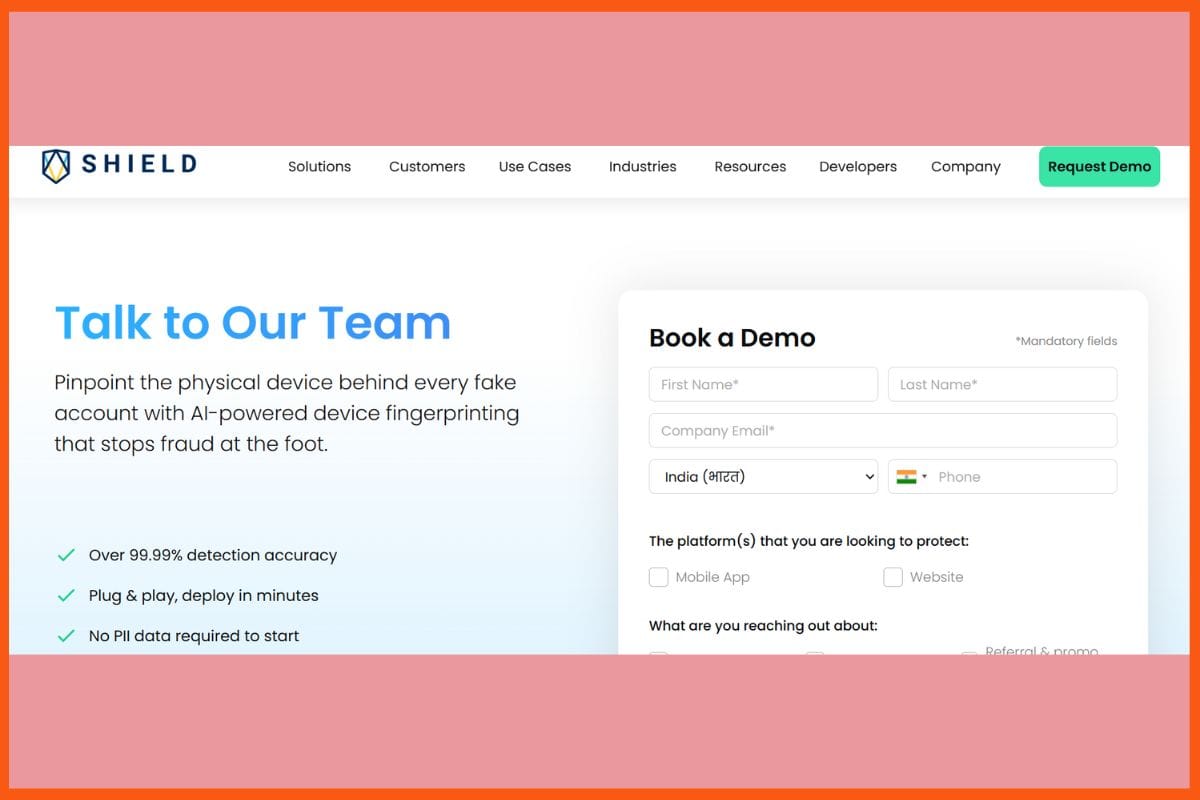
Sift, an AI-based fraud detection solution, is very popular in banking due to its extensive global data network, real-time anomaly detection, and behavioral analytics, enabling proactive identification of payment scams, account takeovers, and policy abuse. The platform also delivers Clearbox Decisioning to promote transparency in AI logic, easy integration with other systems, and a no-code interface for creating custom workflows for quick deployment. Designed for scale, Sift can handle high transaction volumes while providing industry-specific workflow templates that make it easy to operate. The transaction fees begin at $0.06, but custom quotes for enterprises are available based on the volume and features selected.
Pros
- No-code dashboard for rapid rule customization.
- International identity search and pre-built fraud workflow templates for banks.
- Very scalable in high transaction volumes.
Cons
- Steep learning curve.
- Support team is slow to address customer problems.
Pricing
Sift offers custom pricing; contact them for a quote.

ComplyAdvantage
| WEBSITE | complyadvantage.com |
|---|---|
| Rating | 4.6 |
| Free Trial | Yes |
| Best For | Financial institutions and fintechs needing AI-driven AML screening, transaction monitoring, and risk management. |

ComplyAdvantage, an AI-based fraud detection tool developed for banks and payment providers, leverages machine learning, clustering of identities, and graph network analysis to track over fifty types of fraud that include account takeover, push payments, and, more recently, synthetic identities. The system generates lucid and explainable alerts and operates in real time, along with money and non-money events. The platform is unified and easy to deploy, going live in less than two weeks. ComplyAdvantage also adapts quickly to new payment methods and criminal tricks. With comprehensive customization and transparent decisions, it helps institutions stay ahead of fraud without breaking their stride for uninterrupted processes.
Pros
- The fraud alerts are explainable and actionable
- Detection occurs in real-time across login, profile changes, and transactions.
- Rapid implementation and flexible data integration.
Cons
- Bugs in usability and user experience.
- Custom and enterprise plans will require negotiation.
Pricing
| Plan | Pricing |
|---|---|
| Starter Plan | $119.99 / month |
| Enterprise | Custom |
Hawk AI
| WEBSITE | hawk.ai |
|---|---|
| Rating | 4.5 |
| Free Trial | No |
| Best For | Banks, payment providers, and fintechs seeking real-time, AI-powered AML and fraud detection with transparent monitoring. |
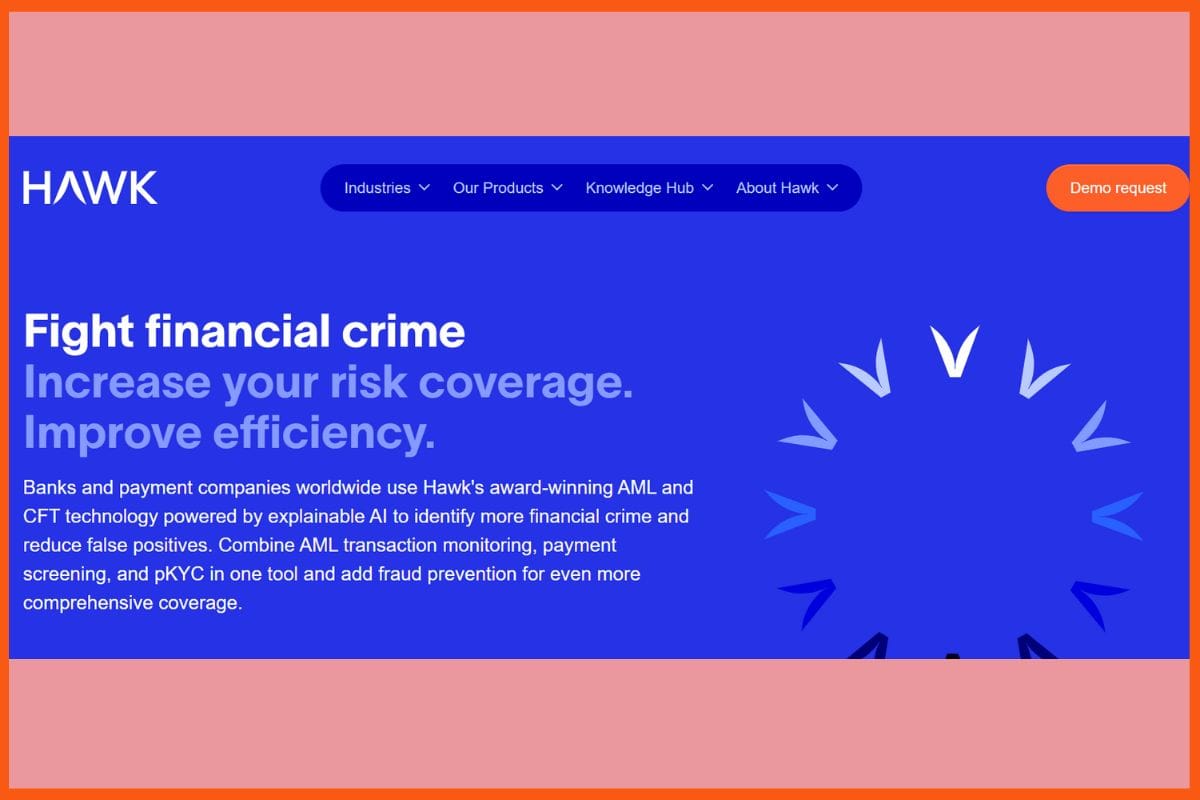
Hawk AI is an extremely useful and intelligible AI-empowered platform for banking fraud detection and AML compliance, which gives very real-time transaction monitoring, automated fraud anomaly detection, and possible up to 70% false-positive reductions. Customized AI models and super-fast deployment methods—mostly in under three days—enable banks to tailor and apply self-service rule management and create transparent reports for compliance audits unique defenses to scout for a wide range of threats. Hawk AI provides for scalable, modular integration as SaaS or private cloud, and easily onto older systems. Its platform spans payment screening, transaction fraud, and entity risk detection, hence making it particularly ideal for modernizing and future-proofing anti-fraud strategies in any financial institution.
Pros
- Comprehensible AI that supports regulatory compliance.
- More than 70 percent reduction in false positives
- Quick deployment of models and self-service customizations of rules.
Cons
- Additional resources and some configuration effort may be needed
- Not as many third-party integrations as some of the other solutions.
Pricing
Hawk AI offers custom pricing; contact them for a quote.

Abrigo
| WEBSITE | abrigo.com |
|---|---|
| Rating | 4.4 |
| Free Trial | No |
| Best For | Financial institutions needing AML compliance, |
Abrigo gives banks and credit unions a powerful fraud detection system based on AI and made to scale. It is an online orchestration engine that works in conjunction with clear machine learning models, adding trust and transparency to the process. In essence, the system combines AI image analysis with one of the largest check fraud data networks and the flexibility of rule setups to catch fraud-related activities across checks, wire transfers, ACH, debit cards, and even new accounts. Complete automation, adjustable modules, and intelligent case management reduce manual effort while providing a structure to make faster and data-driven decisions. The early pilots proved their worth with over 90 percent detection of fraudulent checks.
Pros
- Explainable AI and advanced check image analysis
- Timely onboarding and collaborative case management
- One suite covers wire, ACH, new account, and debit card fraud.
Cons
- Initial setup could take some technical know-how
- Tailored solutions may take longer for implementation
Pricing
Abrigo offers custom pricing; contact them for a quote.
FICO Falcon Fraud Manager
| WEBSITE | fico.com/en/products/falcon-fraud-manager |
|---|---|
| Rating | 4.5 |
| Free Trial | No |
| Best For | Banks, credit unions, and financial institutions needing advanced fraud detection and prevention |
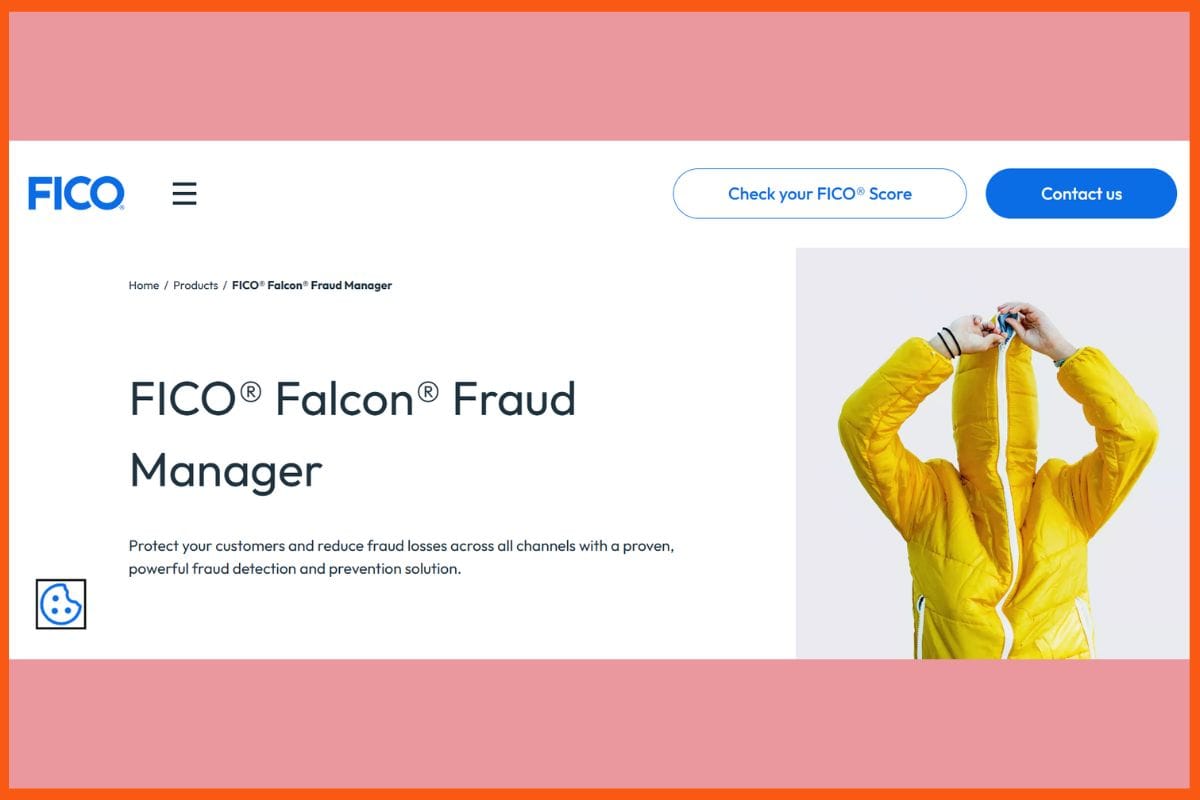
FICO Falcon Fraud Manager uses its advanced AI and machine learning system to monitor billions of transactions in real-time across card, digital, wire, and payment channels for banks worldwide. This neural network and adaptive analytics unearth approximately 50% more fraud than rules-based systems, while portfolio-specific models leverage predictive insights from a consortium of over 10,000 financial institutions. Highly customizable rule engines, exhaustive case management, and around-the-clock global support boost detection accuracy and operational efficacy for institutions of all sizes in either an on-premise or cloud deployment model. Reporting meets global compliance requirements such as PCI and provides rapid alerts to ensure minimum customer impact.
Pros
- 50% more fraud detection compared to standard rules-based systems.
- Adaptive neural network with access to global consortium data for predictive insights.
- Flexible and Modularity deployment options including cloud and hybrid.
Cons
- 6 to 12 months for deployment and integration.
- May be too complicated and expensive for smaller banks compared with targeted tools.
Pricing
FICO Falcon Fraud Manager offers custom pricing; contact them for a quote.
Forter
| WEBSITE | forter.com |
|---|---|
| Rating | 4.6 |
| Free Trial | No |
| Best For | E-commerce businesses and online merchants seeking real-time fraud prevention and chargeback protection |
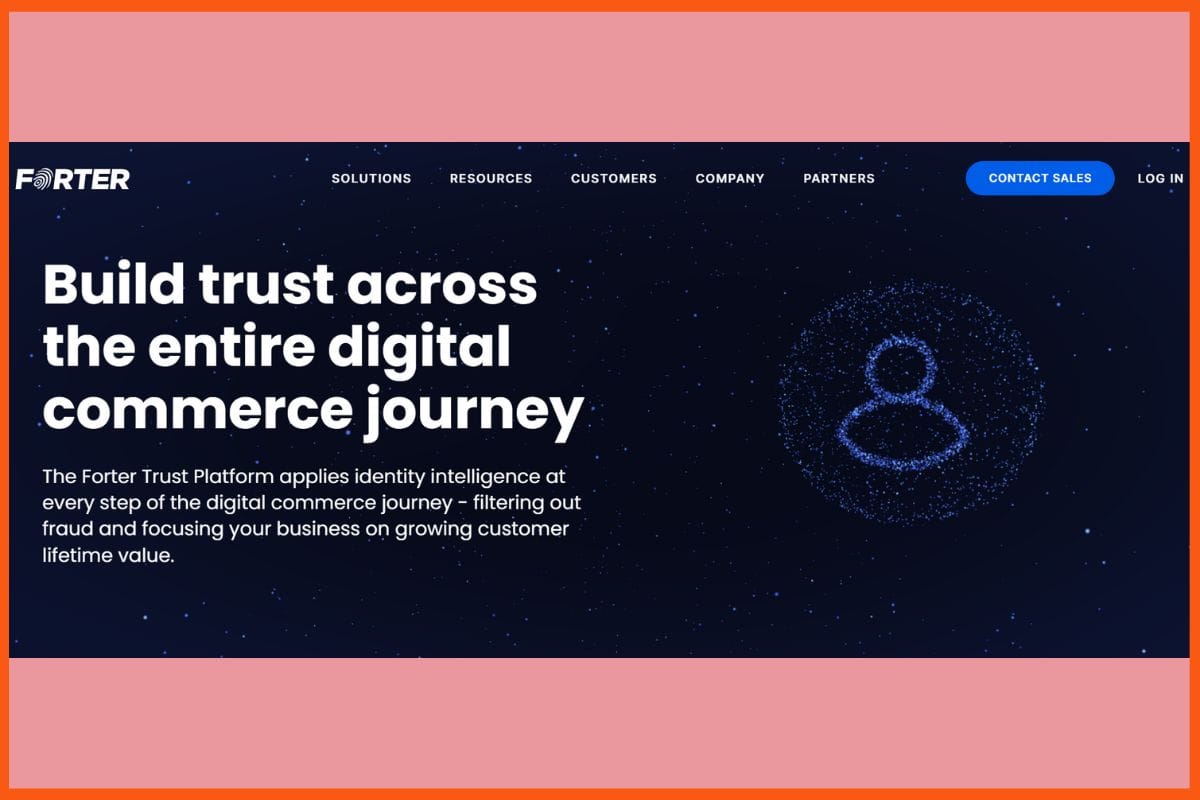
As a service used by banks and payment providers, Forter is completely automatic for AI detecting fraud, providing instant real-time decisions on identity, account takeovers, and chargebacks, as well as abuses of policy. Billions of global transaction data points feed into Forter’s continuous training in machine learning and behavioral analytics to combat developing fraud patterns, while improving approval rates and decreasing false declines. The performance-based and transparent pricing model guarantees chargeback and approval rates. Its networked effect gives predictive models across clients. Forter’s policy builder and instant dashboard reduce friction, build trust with customers, and streamline end to end management of fraud.
Pros
- Real-time, fully automated fraud prevention without manual review.
- Chargebacks can be reduced up to 72 percent and false declines by 46 percent.
- A scalable identity-based protection and abuse policy builder for quick adaptability.
Cons
- Occassional bugs
- Less flexible to those that want hybrid automation / manual review models.
Pricing
Forter offers custom pricing; contact them for a quote.
ThreatMetrix
| WEBSITE | lexisnexisrisk.com/products/threatmetrix |
|---|---|
| Rating | 4.5 |
| Free Trial | No |
| Best For | Banks, fintechs, and enterprises needing digital identity intelligence to detect fraud and reduce risk |
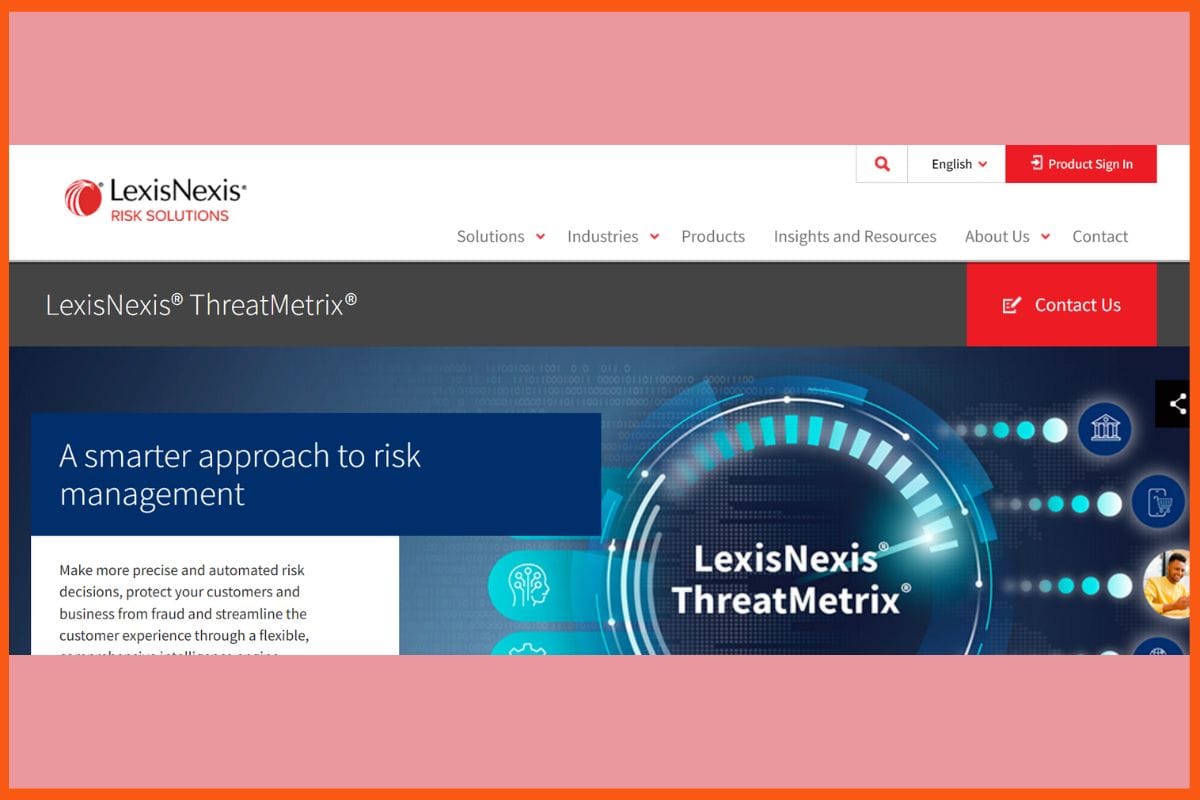
ThreatMetrix is a cloud AI platform for fraud detection that enables banks to provide real-time risk authentication, device intelligence, behavioral biometrics, and access to a global digital identity network. It assesses billions of transactions so that account takeovers, synthetic identities, and payment fraud can be detected rapidly and accurately. Using advanced machine learning and shared consortium data, ThreatMetrix lowers false positives while leaving customer friction at an absolute minimum. Adapts well to smooth and easy integration into compliance with global standards like PCI DSS, GDPR, and PSD2. The platform further permits dynamic policy management, excellent case management, and fast investigation tools ones that would be ideal for large, multi-channel banks looking for protection without impeding the customer experience.
Pros
- One of the critical pros is that it has its
- global intelligence network covering real-time sharing of fraud insights.
- powerful device, behavioral, and identity analytics.
Cons
- Sometimes initial setups with all the data integrations tend to be tricky.
- Depends on the quality and diversity of the input data.
Pricing
ThreatMetrix offers custom pricing; contact them for a quote.
Finscore
| WEBSITE | finscore.ph |
|---|---|
| Rating | 4 |
| Free Trial | No |
| Best For | Financial institutions in the Philippines using AI/machine learning and telco data for alternative credit scoring and fraud detection services. |
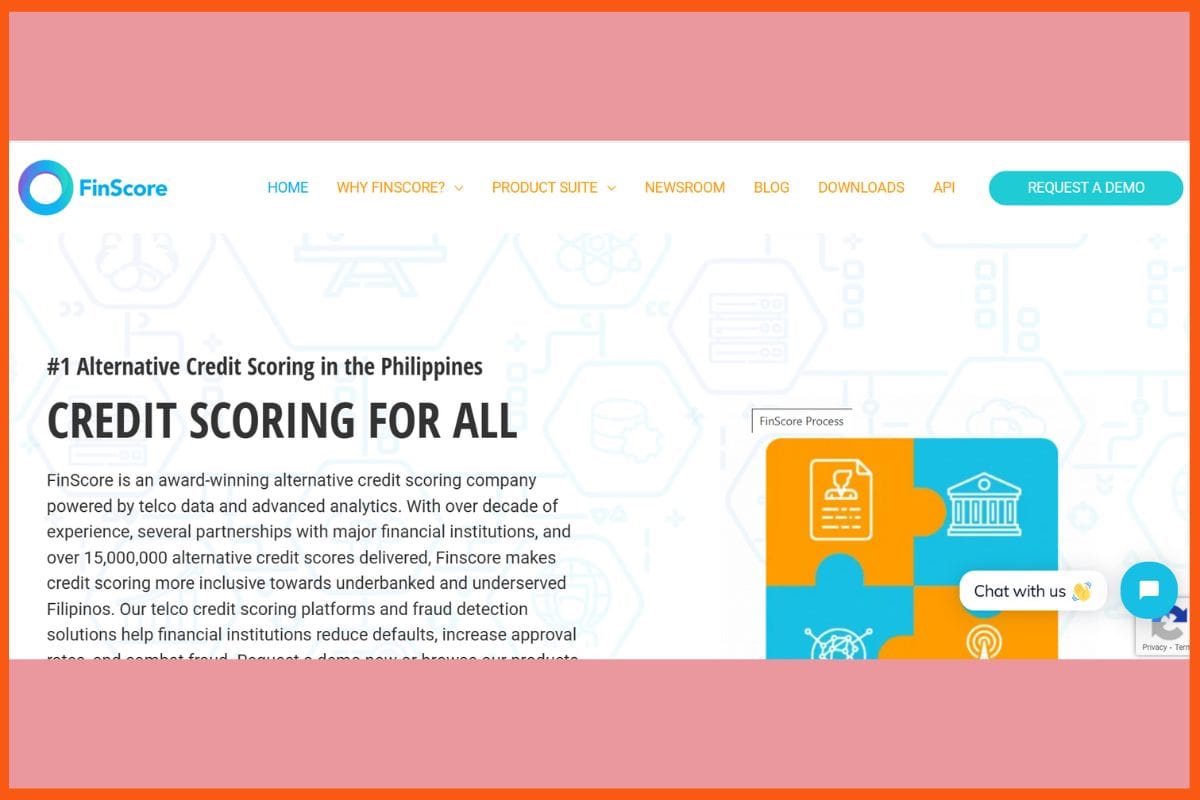
Finscore is an AI-powered fraud detection solution for banks that employs combination telco, alternative and behavioral data to accurately identify risky behaviors and respond to cyber threats in realtime. It features machine learning models that can continuously learn new fraud patterns-in summation, reducing false positives with fewer manual workloads for instant background checks and full integration with the KYC system. Finscore adopts modular dynamics where flexible configuration fits with automated alerts and seamless onboarding for the regulation side and operations side. It’s targeting both fintechs and banks that require deploying quick, customizable dashboards, and minimal operational disturbance; however, effectiveness relies on data quality and regional market knowledge.
Pros
- capitalizes on the telco and social data for very high efficiency in fraud detection.
- Live validation of identity and real-time automated background checks.
- Fully integrated KYC Base Check module for easy onboarding.
Cons
- Effectiveness highly depends on local data availability and partnerships with telcos.
- Very few advanced analytics in comparison with global tier-1 platforms.
Pricing
Finscore offers custom pricing; contact them for a quote.
Kount
| WEBSITE | kount.com |
|---|---|
| Rating | 4.6 |
| Free Trial | No |
| Best For | Businesses needing AI-powered fraud prevention, chargeback management, identity trust, and regulatory compliance tools. |
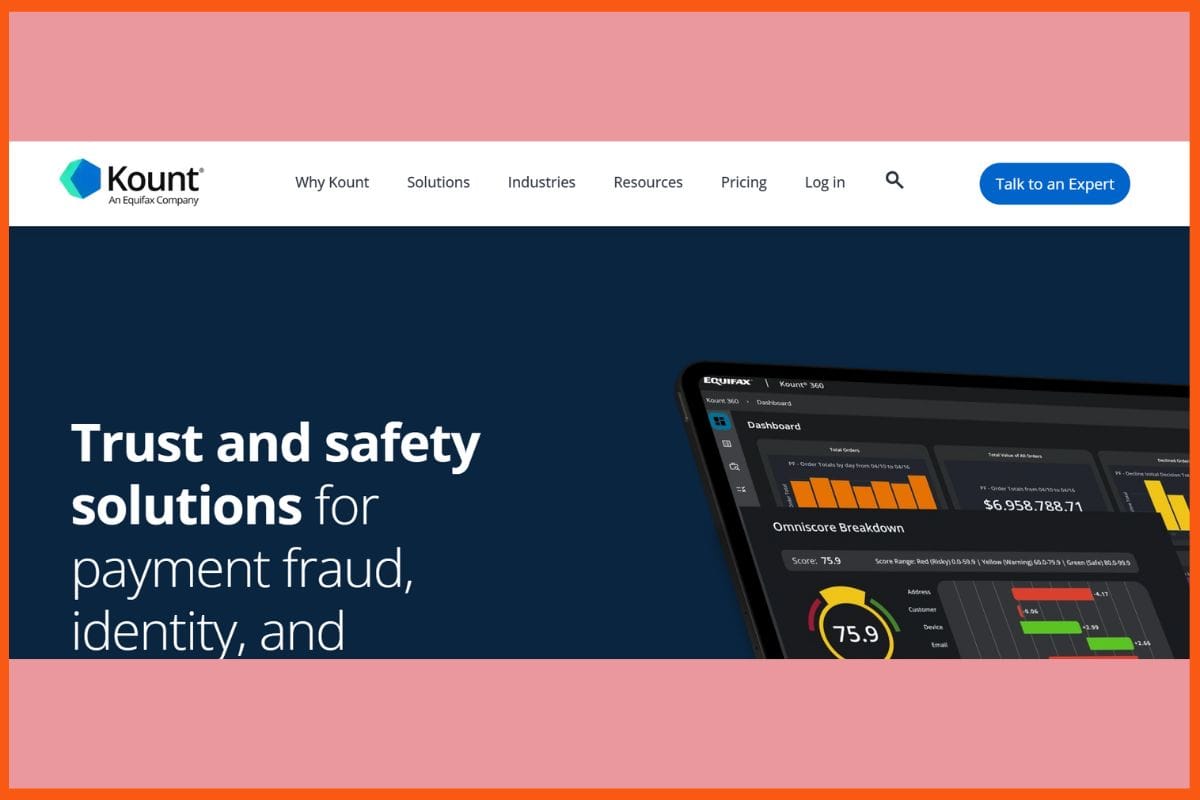
Kount is an advanced artificial intelligence fraud-detection platform that has been designed for banks to protect account opening, payments, chargebacks, and digital identity checks. It uses decades of global interaction data with adaptive machine learning combining supervised and unsupervised models for detecting fraud with high precision. The platform performs risk assessments in real time and makes automated decisions of less than 250 milliseconds, allowing banks to act quickly and keep their customers moving. Its modular setup allows easy integration with core-banking systems, while the clear dashboards present transparent analytics and flexible strategic action tools. With fewer manual reviews, fewer false positives, and layered protection stretched over the entire customer journey.
Pros
- Adaptive AI with supervised and unsupervised ML has more detections and less false positives.
- Easily customizable strategies and modular solutions for unique banking needs.
- Decades worth of historical data for solid accuracy.
Cons
- Inaccuracy might be caused at the start of AI learning curve.
- To reduce accuracy, one needs transaction data of good quality.
Pricing
Kount offers custom pricing; contact them for a quote.
Conclusion
Altering fraudulent detection paradigms with the help of AI tools has made real-time, adaptive protection the industry’s standard future of banking security. While arresting even the very sophisticated cyber threats, these platforms also protect customer trust and regulatory compliance through advanced machine learning progpredactived analytics and behavioral profiling. Their architectures are highly scalable and rapidly deployable, allowing conversion of transaction environments across institutions of any size to respond immediately to changing fraud patterns with minimized losses and low operational burdens. As threats become more sophisticated, banks will gain strategic advantage with solutions that include artificial intelligence by converting risk management from a reactive task to a proactive shield.
FAQs
What are Best AI Tools for Fraud Detection in Banking?
Best AI Tools for Fraud Detection in Banking are:
- Feedzai
- Sift
- ComplyAdvantage
- Hawk AI
- Abrigo
- FICO Falcon Fraud Manager
- Forter
- ThreatMetrix
- Finscore
- Kount
How does AI detect fraud in real-time transactions?
AI fraud detection tools analyze large volumes of transaction data using behavioral profiling, predictive analytics, and anomaly detection to instantly spot suspicious patterns and trigger alerts before fraud occurs.
What are the key benefits of AI fraud detection tools for banks?
Key benefits include reduced false positives, faster fraud prevention, real-time monitoring, compliance with AML regulations, automated alerting, and improved customer trust with minimal friction.




